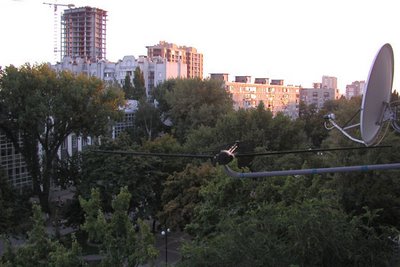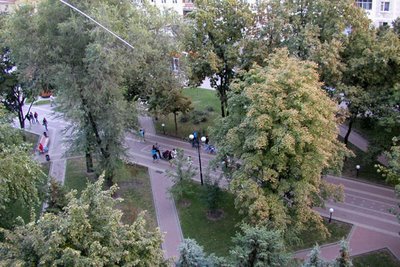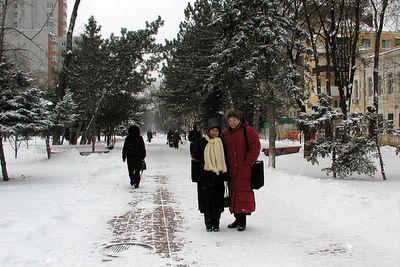

You’re going to have a problem in the kitchen, friend Julia said. There’s no place to put the washing machine.


But, as the Aussies say, “No worries, matey!” A new apartment landed right in my lap thanks to the unofficial network of Russian babyshkas, the grandmothers who know what’s going on with everybody. The sweet, busy-body babyshka (BBB) on 6th floor asked if I knew of anybody looking for an apartment. At first I couldn’t think of anybody (duh) but eventually I did (guess who) and dear BBB connected me with the owner of the newly available apartment.

 Left: Views north, northwest from apartment on Pyshkinskaya.
Left: Views north, northwest from apartment on Pyshkinskaya.

Photo: Harry’s American Sandwich Bread: “HOW TO MAKE A GENUINE

"For the making of a genuine sandwich."


* * * * *
Forty-nine years have passed since that conversation on the front porch swing. Forty-nine
The billows are tossing high.
The sky is o’er shadowed with blackness,
No shelter or help is nigh.
Carest Thou not that we perish?
How canst Thou lie asleep,
When each moment so madly is threat’ning
A grave in the angry deep?
Master, with anguish of spirit,
I bow in my grief today;
The depths of my sad heart are troubled;
O waken and save, I pray!
Torrents of sin and of anguish
Sweep o’er my sinking soul!
And I perish! I perish, dear Master;
O hasten and take control!
“Dad, listen to me. You think all is lost. The Prince of Darkness, the Father of Lies is whispering in your ear. Telling you that life has been hopeless and that your future will be miserable. Please Dad, look to the Master. Like you told me so long ago, God is in control. Please Dad, the song doesn’t end here. Dad, please stay for the next verse. . .
The elements sweetly rest;
Earth’s sun in the calm lake is mirrored,
And heaven’s within my breast,
Linger, O blessed Redeemer,
Leave me alone no more;
And with joy I shall make the blest harbor,
And rest on the blissful shore.
Peace, be still!
Whether the wrath of the storm-tossed sea,
Or demons, or men, or whatever it be,
No water can swallow the ship where lies
The Master of oceans and earth and skies;
They all shall sweetly obey Thy will,
Peace, be still!
Peace, be still!
They all shall sweetly obey Thy will,
Peace, peace, be still!
I was walking home from church Sunday afternoon carrying two bouquets of flowers when a distinguished 50-something gentleman approached me on the sidewalk.
I turned around and there were 16 pair of eyes on me. Conversation stopped, all were turned in my direction and gazing unabashedly.
He meant it as a question but I wasn’t sure what to think. His words sounded abrupt because of his emphasizing the WHAT and not raising the pitch of his voice at the end of the sentence. Nevertheless, I followed his lead and switched to English. Shortly he interrupted again and told me that I would need to speak with another official later. I doubt that he understood much of what I was saying.
* * * * *
I had a similar experience recently at the bank when picking up funds. The teller was giving me instructions, all in Russian of course, about where to sign the various documents. She was speaking loudly enough that the entire room could overhear and then when she announced the grand cash total, I felt my mouth go dry.
I looked around and other tellers had paused mid-task, customers had turned to look and even the security guard was staring in my direction.
* * * * *
And so you see, staring happens and it ranges from gawking at passersby on the street to curiosity about private transactions. I find it unnerving to be stared when I’m conducting personal business. The staring is only momentary, of course; gazes shift to another person or perhaps to a fly buzzing in the window. But after several uncomfortable staring incidents recently, I decided to that I must address this issue of staring. How to deal with it? Through understanding and through humor. As though that were easy. First, a Google search: staring and culture.
First, there were tips for a person from an Okay-to-stare culture being transplanted into the Australian culture:
“Sta-YAT” and the dog stays.
“Ko mne” and the dog goes to the owner. On a good day, anyway.
That got me thinking about animals and their understanding human language. By the way, the average dog understands 165 words, a quick Google search showed. But I’m wondering if the owner were to give a Russian-trained dog the commands in English if the animal would understand. I’m wondering, is it the word itself that the dog comes to understand? Or does the dog understand the word in combination with intonation, particular gestures or the situation?
* * * * *
Actually, I’m more interested in my own pets, Sunny the canary and Kesha the cockatiel. I like to think that they are multi-lingual. I base that on some quasi-scientific experiments I’ve conducted with Sunny.
I say “Good morning,” and he chirps a greeting.
“DO-broy OOT-rah,” and he responds to the Russian.
Today I added Greek to the mix.
I like to think he understands. I have yet to test his response to Turkish or perhaps Mandarin Chinese.
Languages and animals: Maybe someday we’ll understand each other perfectly. In the meantime, there’s some sort of understanding.
“Sunny, heel!"

Today, the 9th of May is the 61st anniversary of the Day of Victory, celebrating victory over the Nazi occupation of
Hundreds of silver-haired veterans marched through the city this morning, the street lined with cheering crowds. It was a scene duplicated in cities spanning the nation’s 11 (or so) time zones: By-standers rushed out into the parade to hand red tulips and lilacs to the marchers. The veterans proudly sported their uniforms encrusted with war medals.

"(Congratulations) with the Holiday!"
Think of the typical Memorial Day celebration in the

Somebody's Beloved Grandpa. Stopping the parade for a quick photo.
Lots more photos in my Webshots.com photo albums.
“University students buy their grades here. Did you know that?”
It was
We continued walking west, talking about my work, about her university studies and about life in
“It’s true,” she nodded. “It’s not uncommon for students to buy their grades here.”
“How much is an A?”
“An A can run between 3,000 and 8,000 rubles.” (That’s US$105 to $280.) “But the good students, the professors know who they are and won’t give them any problems.”
I had more questions but she needed to get home.
* * * * *
The conversation slipped my mind until Sunday after church when walking to lunch with dear friend, Julia.
“How’s Anton?” I inquired. Her son is a freshman at the university. A marginal student in high school, his acceptance into university was a great relief. It was either that or two years in the army.
“Anton’s okay. But he’s not doing very well with his studies,” Julia frowned. “He’s not the best student they have. Anton gets frustrated because he sees others who aren’t studying but they’re making good grades.”
“They don’t study but they make good grades?”
“Right. You know, it’s common here for students to bribe their professors for grades.”
“I had heard that. Is it really true?”
“Yes, absolutely. An A or a passing grade might cost $100. (That’s half a month’s salary for the average wage earner.) Not all will accept bribes. But everybody pays off everybody else here. Students pay their professors and parents pay to keep their sons in school and out of the army.”
“Looks as though the professors make more money. The students get good grades and everybody is happy.”
“Right. Except, of course, for those of us who can’t afford to pay.” Julia was upset. A single mother, she works several jobs to keep going. Her budget doesn’t include a slush fund for bribes. More importantly, she distains corruption. Julia was distressed at how the whole thing was affecting Anton and his studies.
* * * * *
Out of curiosity, I did a Google search on this issue and found lots of information.
The typical Russian also frequently pays bribes to institutions that are meant to be free of charge including hospitals, police and the army. Higher education now tops the list of bribe-accepting institutions. Students use bribes to get good grades or to get accepted into prestigious universities. (Radio Free
Only half of high school seniors are accepted into a university without resorting to bribes, according to another poll. The average amount of such bribes is US$1,200. (Novaya Gazeta, July 2004) Further, in the first six months of 2004, 5000 Russian families spent over 400 million dollars in bribes for their students to be accepted into university, to pass an exam or to have their grades raised. (Novaya Gazeta, August 2004).
* * * * *
So bribery goes on. But as I see it, that’s only part of the picture. There are many people here with the highest of ethics who find bribery disgusting. There are professionals who operate with the highest of standards. That includes the trauma clinic physician who updated my tetanus shots last week after the dog bite I mentioned. He could have charged me quite a sum and slipped it in his pocket. I was prepared to pay something but he shrugged his shoulders and declined payment.
My guess is that the 50% of students who do get into university without bribery are the top-notch students who are motivated to study. They have no need to bribe and are serious about preparing for a career. The 50% who do resort to bribery are the students out on the academic fringes who would flunk out elsewhere. I need to consult several more of my “local sources” on this topic of bribery. More to come. (And it won't even cost you!)




